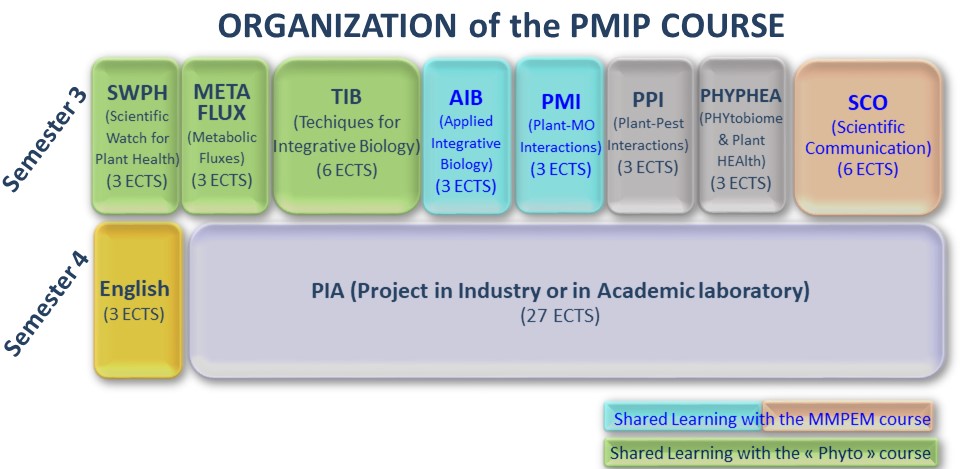ORIGINALITY of the PMIP COURSE
The training, entirely in English, will be given by researchers, lecturers, and professionals from the private sector and will be partly shared with the M2 MMPEM (Master's degree in Microbiology) and the M2 "Phytoressources and Phytosciences" (Master's degree in Plant Biology). The first class will be welcomed in September 2022.
Our objective is to train experts in plant-microorganism interactions, who will be able to propose new natural solutions to meet the main challenges of agronomy, agri-food and the environment.
After completing this course, graduates can go on to a PhD thesis or enter an industry or a research organisation at the engineer level
CONTENT of the PMIP COURSE
UE METAFLUX "Metabolic fluxes” (3 ECTS): Lectures and applied courses deal with the integration of primary and specialized metabolism in plants in a temporal dimension (fluxomic). This will require addressing the different indirect methodologies to measure real speed metabolic reactions in the integral biological system (intracellular flow, intratissular). For this purpose, the following points will be addressed : (i) Isotopic labelling strategies (13C, 18O, etc…), (ii) detailed isotopomeres analysis and isotope incorporation into metabolites by NMR and mass spectrometry, (iii) metabolic flux maps and metabolic networks.
UE PHYPHEA "Phytobiome and Plant Health” (3 ECTS): This course deals with the notions of microbiome and holobiont in the specific context of plants (phytobiome) and addresses the influence of the environment on the health of plants and their associated microbiota. The following points will be addressed : (i) how the plant organism is able to influence its microbiota, both in terms of composition and functioning ? (ii) what is the impact of the microbiota on the functioning of the plant ? (iii) what is the influence of this cooperative behavior on the ability to respond to environmental stresses ?
UE PMI "Plant Microorganism interactions” (3 ECTS): A series of lectures will be given by researchers exposing to the students the latest developments in their field of research work. These conferences cover the interactions between microorganisms (bacteria, fungi or oomycetes and their host plants). The molecular mechanisms of positive interactions (symbiosis, mutualism) or harmful interactions (pathogenicity) will be detailed.
UE AIB "Applied Integrative Biology” (3 ECTS): Training courses dedicated to the integrative analysis of multi-omics datasets obtained by different scientific experts working in the area of plant-microbe interactions.
UE SWPH "Scientific Watch for Plant Health” (3 ECTS): The objective of this course is to provide students with the basis for thinking about the strategic approaches implemented in research, whether fundamental or applied, public or industrial. This course will be composed of an important part of scientific seminars given by researchers from both the public and private sectors. In addition, the students will have to produce a scientific survey on the basis of an innovative or prospective topic and they will have to establish a correlation with the scientific seminars they have attended.
UE SCO "Scientific Communication” (6 ECTS): The course includes lectures and practical sessions on the different dimensions of oral, poster and written scientific communication. The aim of this course is to enable students to understand the different stages of the process of designing, preparing and producing a relevant and impactful scientific communication according to the different media. This course prepares students for the bibliographic and experimental reports required in the framework of the Master 2 programme, as well as for the oral defense of experimental work at the end of the Master 2 program.
UE PPI "Plant Pests Interactions” (3 ECTS): A series of lectures will be given by researchers exposing to the students the latest developments in their field of research work. These conferences will cover the interactions between plants and different pests (insects, nematodes, viruses and parasitic plants).
UE TIB “Techniques for Integrative Biology” (6 ECTS): Integrative biology is an interesting and innovative approach to understand the functioning of plant organisms considered as systems and apprehended in their entirety by integrating the different biological compartments. "Omic" approaches offer the possibility to explore without preconceived ideas the biological processes existing at the different scales of plant organisms. Nevertheless, in addition to the intellectual challenge of understanding the complexity of living organisms in their wholeness, there is a major technical challenge for data acquisition, exploitation and integration. This course will present the different "omics" techniques implemented for plant organisms (genomics, transcriptomics, proteomics, metabolomics, fluxomics, interactomics, phenomenomics...) allowing data acquisition and integration.
UE English/Language: Cette UE a pour objectif d'atteindre au minimum le niveau B2 dans le Cadre Européen Commun de Référence, avant la fin de l’année de M2.
UE PIA "Project in Industry or Academic Lab” (27 ECTS): The academic or industrial project takes the form of a 5-month internship (full time) under the responsibility of an internship supervisor whose designation is validated by the master's pedagogical committee. The student is integrated into a team in which he/she develops the problematic that has been entrusted to him/her. This project can have two different objectives : a fundamental research objective aimed at preparing the student to pursue a doctoral degree or a more applied research objective aimed at leading to the professionalization of the student at the end of his/her degree. The project is evaluated on the basis of a scientific report and an oral presentation. An important part of the evaluation is based on the relevance of the answers provided to the jury's questions: mastering of the concepts and methods used, justification of the scientific approach, ability to analyze the experimental results, future prospects.
Some of the internship topics posted on page "M2 MMPEM, Offres stages" are also open to M2 PMIP students.
